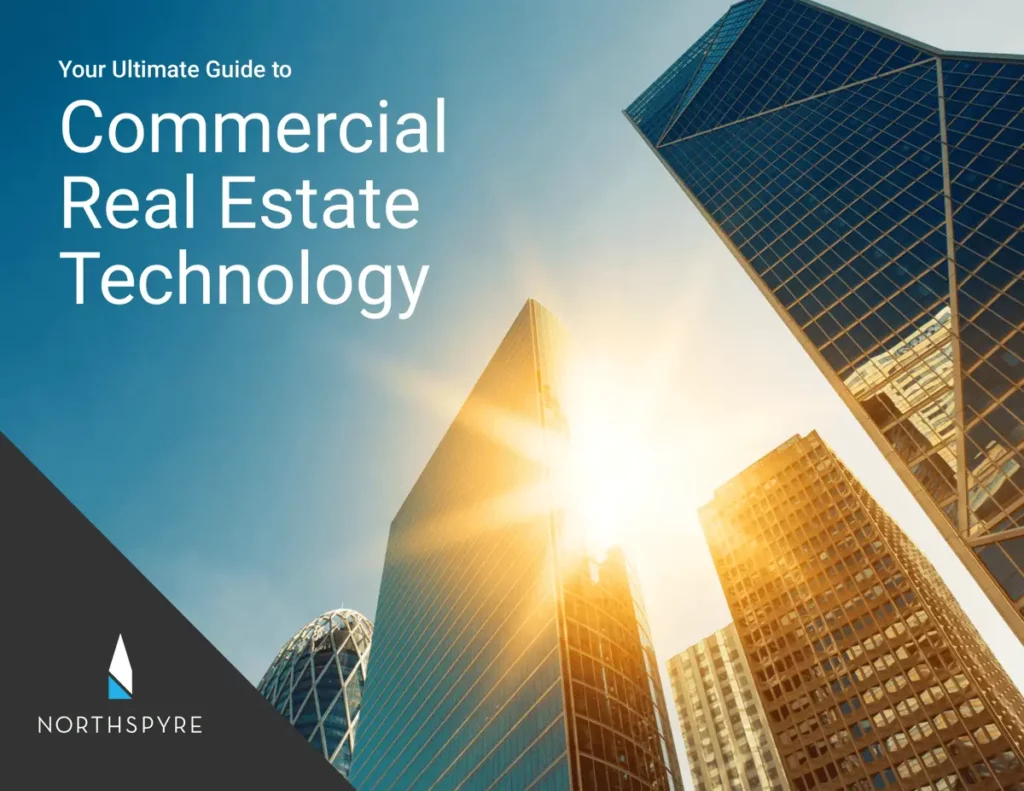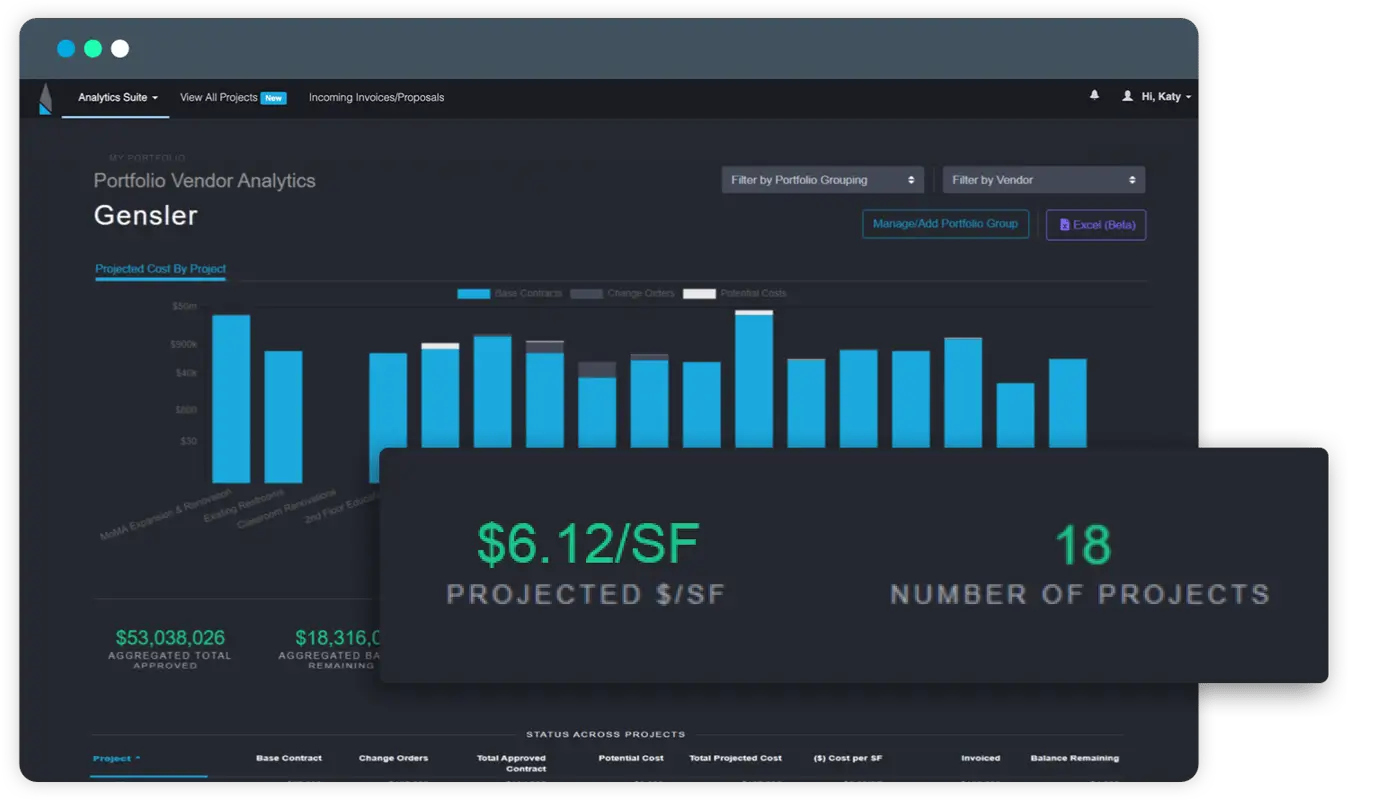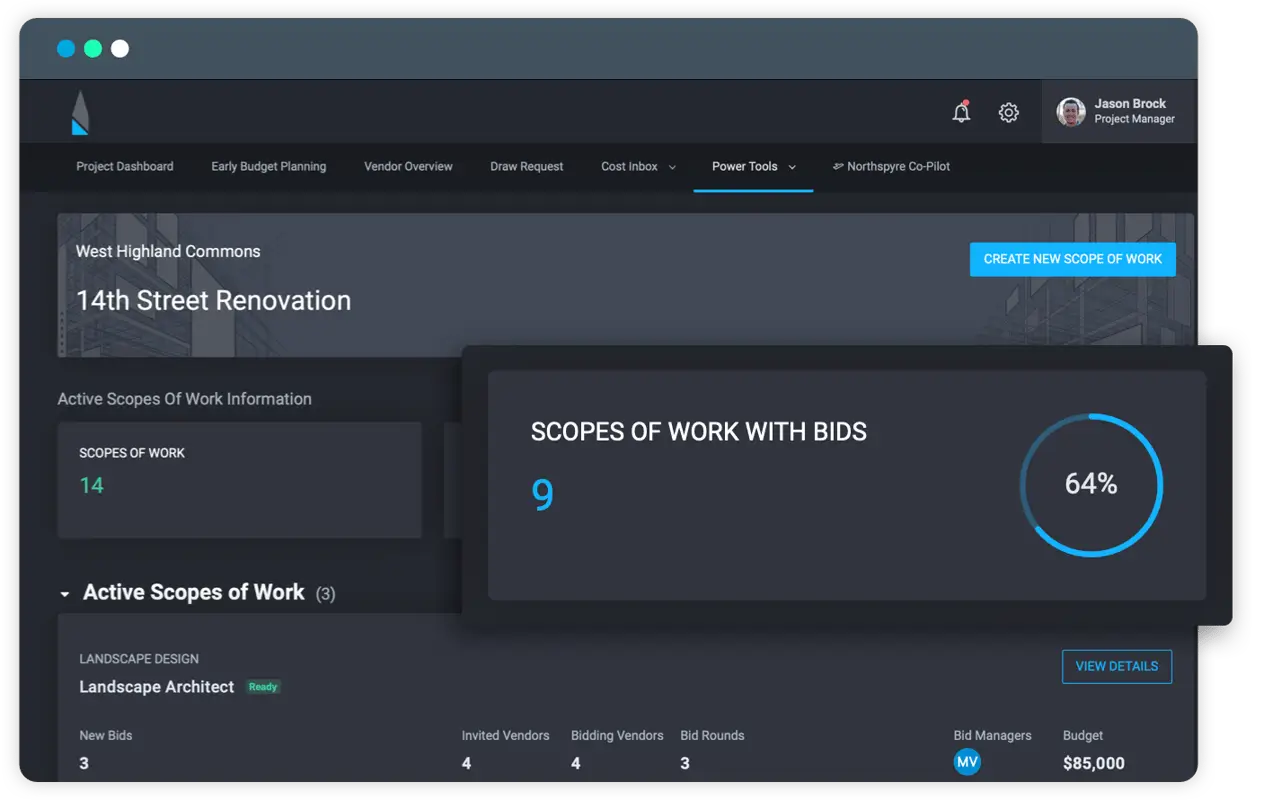Commercial Real Estate Technology
The Ultimate Guide to CRE Technology
How development teams leverage technology to streamline projects, boost efficiency, and maximize ROI.


HOW WE GOT HERE
The Desperate Need for Innovation
Commercial real estate has historically been one of the industries with the least tech penetration. Real estate professionals have been and are still continuously hesitant in adopting new, advanced technology solutions. But, why?
One of the most common reasons: they simply don’t want to change. For decades, teams have relied on manual methods like inputting data into spreadsheets. It’s something they’ve always done, they know how to do it, and it works—sort of.
Traditional methods and routines are not as quick, accurate, or efficient as people may think. In reality, these old-fashioned processes are just time suckers and budget wasters, riddled with hidden errors.
Also, many professionals are afraid to invest in technologies that might not work or integrate easily. When commercial real estate technology first emerged, as early as the 80s in the form of what we today call legacy applications, it was expensive and clunky.
Its bad reputation stuck. Real estate professionals are still worried that it will take too much money, time, and effort to get up to speed on difficult-to-use systems that can take months to implement.
At the end of the day, many real estate professionals just don’t know what advancements have been made and what types of technology are available.

What is Commercial Real Estate Technology?
In the broadest sense, commercial real estate technology is any technology designed for and used in the commercial real estate industry, but it goes much deeper than that.
The commercial real estate industry features many different asset classes including office, multifamily, industrial, and retail. Within those industries are specific departments and roles, from real estate development to property management to transactions and leasing.
Modern technology covers specific needs and solves problems in virtually every phase of the real estate journey
Accounting
Commercial real estate accounting teams manage and track income, expenses and taxes for property owners, brokers and investors, however landlords and property managers may also take on accounting responsibilities.
Appraisal and Financial Analysis
including commercial property valuations and a property’s financial performance
Cash-Flow Management
for expenses and income as well as profits and losses
Fee Calculation
such as leasing
Financial Review
to make sure tax-filing requirements are met
Commercial real estate accounting is complex, with a multitude of complicated details to track. The need for accuracy is high, while the chance for error is also high.
Many teams handle accounting tasks manually, entering and tracking numbers through spreadsheets or legacy accounting-focused applications, making the process timely and cumbersome, while leaving them vulnerable to mistakes. Also, today’s fluctuating market changes constantly and rapidly. In the time that it takes teams to finish their tasks, the numbers and reports may already be outdated, creating numerous inaccuracies.
Accounting technology simplifies the process. It not only saves effort and time when performing and managing all the tasks listed, it also allows for more up-to-date, accurate reporting throughout the entire process.
The right accounting system allows teams to do their jobs more efficiently by helping them send statements and get rent faster, ensuring vendors are paid on time, automatically tracking and updating income, and creating organized documentation in case of an audit.
Accounting technology helps eliminate human error when calculating agent commissions and fees, and streamlines the tracking, sorting and organizing of expenses and income to understand a property’s profits and losses and improve cash flow
With this streamlined process, teams can focus on meeting tax laws and regulations, and taking advantage of tax benefits to grow portfolios.
Why use accounting technology?
- Manage all transactions easily without importing or exporting documents from different systems
- Automate commission and fee calculations and eliminate spreadsheets
- Submit, track, and report expenses from one system
- Keep all financials organized and accurate throughout the year, no more sifting through unreliable paper trails.
Real Estate Development Software
Today, most highly skilled development team members are burdened by low-value admin work, keeping them from focusing on the strategic direction of a project or portfolio, and preventing them from finding more opportunities to create value.

Most project teams still rely on spreadsheets, siloed information and gut instincts to make decisions.
They also rely on unorganized records of past projects, causing them to repeat mistakes or oversights.
Made to address the common problems development teams face, proactive intelligence leverages the power of automation, data analytics and artificial intelligence to help teams make data-backed decisions and better mitigate risk.

Eliminate Tedious Tasks
Automation eliminates tedious, manual administrative tasks like data entry, manual reporting, information gathering and document filing to free up time for the strategic decisions that maximize returns.
The power of A.I. facilitates real-time data analysis, allowing project leaders to make the most informed choice on every project decision, adding up to higher returns.
With proactive intelligence, teams can be more confident that they’ll keep their projects on schedule and under budget while leveraging all of their historical data to be well prepared for future developments.
Why use proactive intelligence technology for project delivery?
Problem Solving
Easily find the data you need to answer difficult questions and solve problems quickly and confidently
Early Warning Systems
Harness real-time data and warning systems to prevent cost overruns
Data Analytics
Deliver projects on time and on budget with more control and visibility over your project throughout its lifecycle
Historical Data
Benchmark costs across current and past projects automatically to understand risks and negotiate smarter
Project Visibility
Understand the project from every vantage point, from past reporting periods and draw summaries to forecasting and projections
Reduce Workload
Eliminate manual administrative work and streamline communications across the firm
Proactive Decisions
Make more informed, proactive and strategic decisions overall
Transactions, Underwriting and
Asset Management

In commercial real estate, acquiring new assets and putting together deals can be fast-paced and challenging.
Bringing together disparate data sets such as rent rolls, capital expense cost assumptions and market comparison data (for transaction costs and leasing assumptions) is often time-consuming and prone to discrepancies given the need to retrieve and reconcile data from so many sources.
Additionally, all of this information must be financially modeled so that real estate owners can make decisions about the feasibility of whether it makes sense to acquire an asset, invest in major capital upgrades, or other investment decisions about a property.
Why use transactions and underwriting technology?
Reduces Errors
Reduces room for errors in complex financial models
Quicker Decision Making
Speeds up investment decisions
Standardization
Brings more coherence and legibility to messy datasets like rent rolls
Reduce Risk
Lowers the risk associated with underwriting missteps

Historically teams have leaned on spreadsheets but also more sophisticated technologies to help real estate financial analysts or asset managers make determinations about how much to invest in an asset, when to make investment decisions, and explore alternatives scenarios for value creation through real estate assets they already own or ones they are contemplating acquiring.
With technology for transactions, underwriting and asset management; real estate professionals can get the highest and best use out of properties after analyzing and modeling key outcomes for a given investment decision.
They can generate necessary reports and get to critical decisions faster, especially in markets where they are competing against other real estate firms to acquire and assemble property sites.
Facilities Management
Facility managers wear many hats—maintenance planner, contracts manager, safety handler, building security administrator to name just a few. With so many demands, they may have a difficult time juggling all their responsibilities, staying organized and maintaining operations and performance.

Facility managers can use facility management technology to multitask more effectively
They can manage the functionality and safety of the environment, interior and exterior maintenance, and entire repair programs remotely from one system.
Facility management tools automate many of a manager’s tasks, like work orders, billing, and invoices saving them time and alleviating burdens.

Facility management tools not only automate these specific tasks, but they improve communication between facility managers and staff through complete information transparency and data sharing. Teams can leverage the data to identify areas of improvement and increase efficiency.
A big benefit of facility management technology is cost reduction. Through accurate reporting, managers can make better maintenance decisions, prevent urgent repairs, and enhance equipment performance, saving money in the long run
Why use facilities management technology?
Safety
Manage functionality and safety of environment
Visibility
Get a complete picture of all facilities
Accurate Records
Keep an accurate record of work order, maintenance, and repair history
Better Maintenance Management
Manage interior and exterior maintenance effectively
Track Repairs
Prevent and handle repairs strategically
Easier Communication
Actively communicate with employees and contractors
Lower Costs
Reduce costs through planning maintenance, streamlining the process and increasing productivity
Property Management
Property managers aren’t just responsible for finding tenants and handling complaints, they also handle tasks like rental applications, rental collections, facilities inspections, and property costs. On top of that, they manage property staff and scheduling.

Overall, property managers and property management companies need to increase a property’s performance, while keeping tenants satisfied.
Property management software allows property managers, property management companies and landlords to handle daily operations of commercial rental and housing properties using one centralized system.
The technology automates tenant applications, screenings and rent collections to save property managers time. This allows them to focus on increasing a property’s performance.
Property Management tools store and organize all documentation, from leases to insurance policies, eliminating inaccurate and difficult-to-find paper files, and providing managers with instant access to important information
Why use property management technology?
Centralized Management
Manage multiple rental properties from one place
Streamlined Scheduling
Streamline staff and contractor scheduling
Better Organization
Organize lease applications, maintenance issues and accounts

Accurate reporting of property expenses help managers stay on budget and owners stay on top of their investment.
These tools are designed to streamline the property management process by helping to manage assets, lease applications and maintenance issues, as well as organize tenants, accounts and finances.
With so many property management systems on the market, it can be overwhelming to decide which one is right. Ultimately, property management technology should give managers or landlords the freedom to direct their attention on their residents and owners.
Leasing
Leasing technology organizes a multitude of complexities by automating burdensome tasks. Property managers use the tools to gain visibility into all leases, store lease information, map rental locations, organize rent schedules and manage lease portfolios overall.

Leasing technology also provides insights and alerts to keep track of portfolio activity, shows a complete view of financials, proposals and terms to negotiate and approve deals faster, and offers visibility into tenant relationships to improve retention.
Leasing technology is specifically designed to manage commercial real estate leasing activities. The concept seems simple, but to property management firms and landlords, it’s a huge time saver.
Why use leasing technology?
Lease Visibility
Manage multiple rental properties from one place
Centralized Data
Streamline staff and contractor scheduling
Portfolio Management
Organize lease applications, maintenance issues and accounts
Automation
Automate rent schedules
Better Relationships
Build tenant relationships
Real-Time Data
Get up-to-date deal terms
Deal Management
Keep deals on track and file leases faster
Embrace the Future of Commercial Real Estate Technology
No matter what role a professional plays within commercial real estate, traditional processes and manual tasks are wasting time, causing inefficiencies, and generating unseen errors.

Current technology is solving big real estate challenges.
The tools are not only reinventing the way professionals perform their jobs, but they are also transforming the commercial real estate industry as a whole, by:
– Creating more opportunities
– Driving efficiencies
– Mitigating risks
– Streamlining the process
– Generating better outcomes
– Eliminating mistakes
– Saving money, effort and time
– Decreasing overhead costs
– Finishing projects on time and on budget
– Allowing teams to focus on more important tasks

Real Estate Intelligence is just the latest innovation in commercial real estate.
Northspyre, a cloud-based intelligence platform, is making a major impact on the way projects are delivered across the industry. Northspyre eliminates data entry and other tedious administrative tasks, provides real-time access to critical project data, generates key actionable insights, increases visibility into project metrics, and mitigates potential risk.


See Northspyre in action
See how leading developers use Northspyre to work smarter at every stage of the development lifecycle.